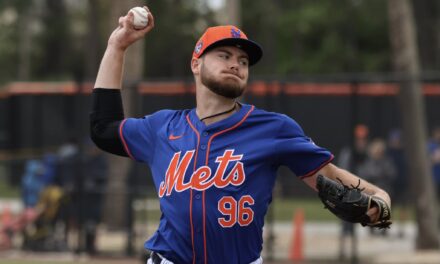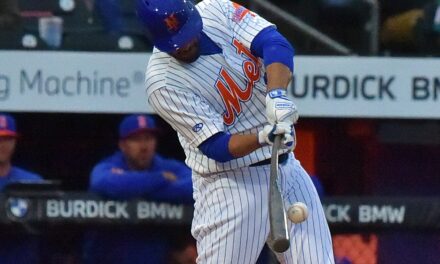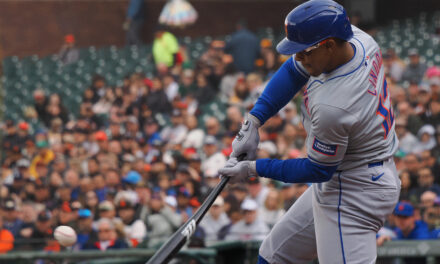
If Jacob deGrom’s Monday night start against the San Diego Padres was his last as a New York Met, it almost wouldn’t feel so bad.
After the organization’s humiliating weekend rendered Yoenis Cespedes’ future in question, Noah Syndergaard on the disabled list, and Jeurys Familia on the Oakland Athletics for an underwhelming return, manager Mickey Callaway mismanaged a ninth-inning comeback attempt that dropped the team to 17-games under .500.
Callaway’s mismanagement left the team vulnerable after deGrom’s eight inning, 10-strikeout performance. After Jose Reyes reached on an Eric Hosmer error to lead off the ninth, the rookie manager opted to pinch-hit Ty Kelly.
Kelly, who owns a .252 on-base percentage vs. right-handed pitching in his career, was ordered to bunt while Kevin Plawecki and his career .319 on-base percentage vs. right-handed pitching was left on the bench.
Conventional baseball wisdom supports everything about this decision: The home team wants to advance a lead off runner in the bottom of the ninth to inch closer to a tie game and thus uses a player who appears to play the best part. Kelly is a small-framed utilityman; he is the archetypal player for the situation. Identity bias most certainly plays a role here.
What should be conventional baseball wisdom – the ability to utilize a wealth of knowledge to make a decision that grants a team the best opportunity to win – is yet somehow still considered advanced. Kelly should not have been positioned with batting, but if it was a necessary decision because Plawecki was unavailable then Kelly should not have been called on to bunt. A runner on first with zero outs will score an average of .2 runs greater per situation than a runner on second with one out.
The Mets famously pegged Callaway as Terry Collins’ replacement after only one interview. During Callaway’s introductory press conference, he candidly spoke about the need to identify individual player strengths to maximize their deployment. He failed to do so last night, but it should not facilitate a call for anything drastic. No, not during this lost season; especially when Reyes led off the inning.
To be sure, Callaway botched tonight’s ninth-inning replacement. However, he faces unprecedented handicaps that limit him to playing with fewer assets than other, more capable organizations.
Jay Bruce was day-to-day before landing on the disabled list. Jeurys Familia was unavailable because of a rumored trade for two games, Yoenis Cespedes remains on the active roster despite reportedly needing surgery. Todd Frazier tried to play through injury. AJ Ramos suffered through several poor appearances before shoulder surgery ended his season. Reyes inexplicably starts a majority of games during a lost season whilst almost anyone else at Triple-A could produce equal or greater results.
Callaway has been thrust into a boxing match against professional fighters with one hand tied firmly behind his back.
He has the ability to land shots, but they are too few and far between. Any attempts to outmaneuver his opponents are ultimately temporary until he ends up defenseless in a corner. This, of course, is the fault of an ownership group that meddles in team affairs like an overbearing parent and ignores the advice of its understaffed analytics department. For Callaway and the Mets, it will be difficult to build this team into a perennial contender during deGrom’s prime.
For as great of a shame as it would be to watch deGrom exit the organization under unceremonious terms, it would be of even greater shame to watch deGrom’s most effective years be wasted in an organization that struggles to create a formula that promotes merit-based play and sustained success.















